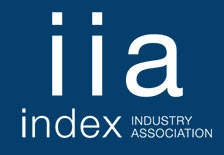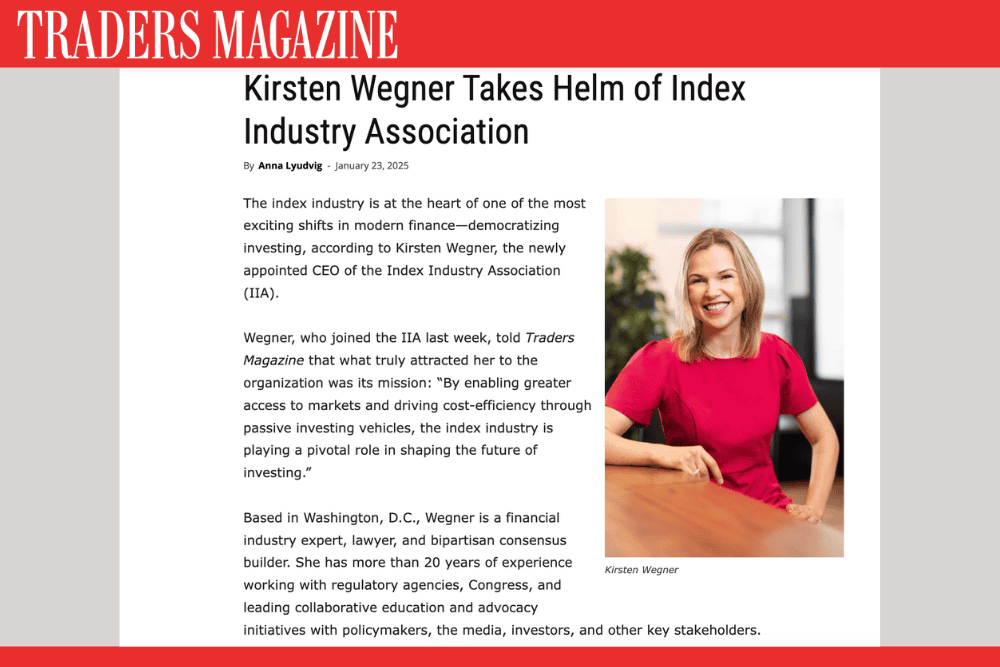- Asset managers expect nearly two-thirds of investment portfolios to contain ESG elements within a decade
- In one year, the number of asset management companies incorporating ESG principles in fixed income increased from 42% to 76%
- Asset managers found significant improvement in ESG tools, metrics, and services
NEW YORK (July 28, 2022) – Despite recent global economic uncertainty and geopolitical turbulence, asset managers reported strong growth in ESG investment over the past year across asset classes and believe it will continue well into the future.
The second annual ESG global survey of asset managers from the Index Industry Association (IIA) found the vast majority (85% globally) reporting that over the past year, ESG has become more of a priority within their company’s overall investment offering or strategy, with just over a quarter (26%) saying it is “much more of a priority.”
“Results of our second annual survey confirm what we’ve been hearing from our members – the asset management community wants to work with index providers to help drive ESG innovation and provide new options to help meet the strong demand from investors,” said Rick Redding, IIA CEO. “The survey results highlight that, among the many links in the ESG value chain, IIA members play an important role in bringing independent benchmarks to ESG stakeholders.”
The survey, which polled 300 investment fund companies in the U.S. and Europe, found that projections for ESG growth have accelerated rapidly from where they were just one year ago. In the next 12 months, 40% of asset management portfolios are expected to include ESG elements (up 13 percentage points from the IIA’s 2021 ESG survey). That projection grows to nearly six in ten (57%) of portfolios in 5 years (up 13 percentage points from 2021). In the next decade, respondents expect ESG elements to be incorporated into nearly two-thirds (64%) of their portfolios – a notable increase from 52% in 2021.
Fixed income on the rise
While ESG incorporation has increased across all asset classes, fixed income has emerged as the fastest growing ESG asset class. In fact, more than three quarters of companies (76%) now implement ESG criteria within fixed income compared with 42% in 2021. This puts fixed income on par with equities – long thought of as the ‘traditional home’ of ESG – which expanded from 53% of companies in 2021 to almost three quarters (74%) in 2022. Commodities are also showing notable growth in ESG criteria, with 47% of fund-management companies we surveyed now implementing ESG criteria for this asset class, compared with 37% in 2021.
“E” Still the primary focus
While the majority of asset managers surveyed incorporate all three ESG elements into their portfolios, this year’s survey shows that the ‘Environmental’ portion receives priority. Four-fifths (80%) of respondents overall agreed that “environmental criteria almost always tend to be prioritized over Social and Governance criteria.” It is difficult to dismiss this as the current reality of ESG investment, as almost the same proportion (78%) agreed that “environmental criteria should always be given priority over social and governance criteria.”
Within the environmental dimension, climate change issues are a top priority for ESG investors. Three quarters (75%) of survey respondents agreed that “environmental performance tends to only be focused on climate change and/or carbon footprint”, while 74% said that “most of our ESG portfolios are climate only.”
ESG ‘toolkits’ have improved significantly, but enhancements still needed
More than nine in ten (93%) survey respondents agreed that environmental impact tracking tools, metrics and services were either highly or fairly effective, a significant improvement on the 66% who felt they were effective in 2021. Ninety-two percent agreed that social sustainability tracking tools, metrics and services were either highly or fairly effective, which also represents a major improvement on the 66% from 2021. Similarly, 93% stated that corporate governance tracking tools, metrics and services are highly or fairly effective, a notable jump from the 69% who found those tools effective in 2021.
Yet ESG corporate data and ratings remain significant areas for improvement, with 31% of respondents citing a lack of transparency and the need for greater public disclosure of companies’ ESG activities. They also highlighted a lack of data standardization across markets and sectors (29%), a lack of agreed ratings and methods among providers (28%), and a lack of quantitative data (23%).
Despite the geopolitical and economic turbulence of recent times, a large majority of respondents indicated that ESG measures are keeping up very (30%) or fairly (59%) well with world events over the past 12 months. However, respondents did see room for improvement, particularly around the need for better integration of geopolitical risk factors.
The helpful role of ESG Indexes
As ESG investing continues to grow, the survey results reaffirm the supportive role that indexes play in ESG investment and benchmarking. Nearly all (99%) of the asset managers surveyed use indexes in some form, with 41% using them for measurement/benchmarking purposes, 31% using them for investment strategies and just over one quarter of respondents (27%) using them for both.
Index providers remain highly trusted by asset-management companies to drive progress in ESG investing. Nearly nine-in-ten respondents (89%) trust index providers a lot (45%) or somewhat (44%) to push financial services ESG innovation and standards – on par with Regulators and the asset management industry itself (both 91%).
“In the face of geopolitical events and evolving regulations, the reliability and transparency ESG indexes provide is essential to the investment ecosystem,” said Redding. “As ESG investing continues to expand, the index industry will continue meeting investor demand for better benchmarks.”
Survey Methodology
Opinium, an independent strategic insight agency, surveyed 300 Chief Investment Officers, Chief Financial Officers, and portfolio managers across four markets: the United States, United Kingdom, France, and Germany.
The survey included 80 respondents each from the US and the UK and 70 each from France, and Germany. Fieldwork was conducted from May 3rd to May 25th, 2022.
About Index Industry Association (IIA)
IIA is an independent, not-for-profit organization based in New York. Founded in March 2012 to provide a voice for the global index industry. The IIA works with market participants, regulators, and other representative bodies to promote competition and sound practices in the index industry in an effort to strengthen financial markets and help them better serve the needs of investors. Our members have been calculating indices since 1896, and today administer more than 3 million indices. These indices cover a wide variety of asset classes, including equities, fixed income, commodities, and foreign exchange.
Many of the leading index providers in the world are members of the IIA, including Bloomberg Indices, Cboe Global Markets, Chicago Booth Center for Research in Security Prices (CRSP), China Central Depository and Clearing, China Securities Information Co., FTSE Russell, Hang Seng Indexes, Intercontinental Exchange (ICE) Data Services, Morningstar Indexes, MSCI Inc., Nasdaq Global Indexes, Parameta Solutions, Qontigo (DAX and STOXX indices), Shenzhen Securities Information Co., Ltd., S&P/Dow Jones Indices, and the Tokyo Stock Exchange.
Visit the newly redesigned IIA website for more information at www.indexindustry.org.
For further information:
James Schiavone, Lansons: (917) 238-9614; jamess@lansons.com
You might also be interested in
Market Uncertainty? Four Benefits of Indexes as a Tool for Investors
Traders Magazine
Kirsten Wegner Takes Helm of Index Industry Association
Traders Magazine
Wegner becomes new CEO for IIA
Asset Servicing Times



